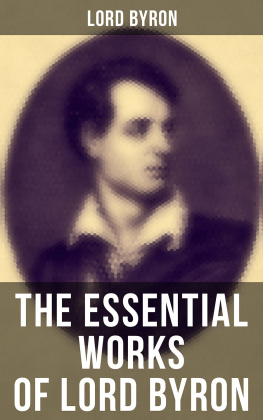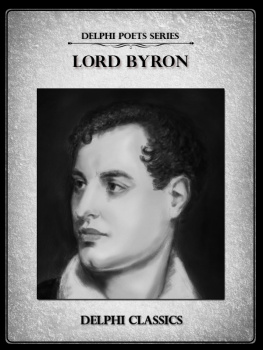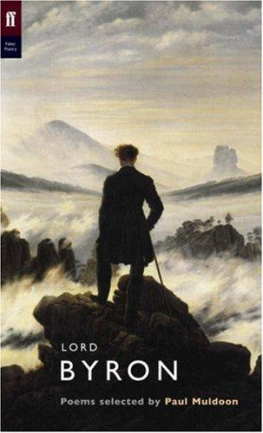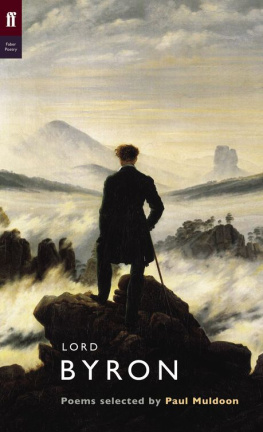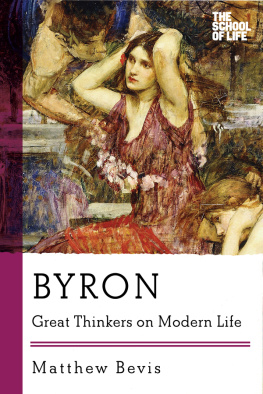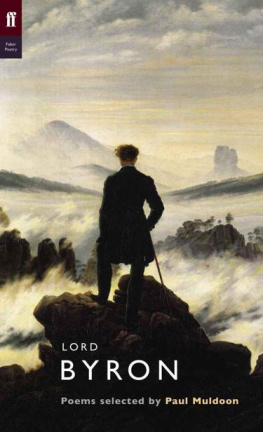Hours of Idleness
To George, Earl Delawarr
1.
Oh! yes, I will own we were dear to each other;
The friendships of childhood, though fleeting, are true;
The love which you felt was the love of a brother,
Nor less the affection I cherish'd for you.
2.
But Friendship can vary her gentle dominion;
The attachment of years, in a moment expires:
Like Love, too, she moves on a swift-waving pinion,
But glows not, like Love, with unquenchable fires.
3.
Full oft have we wander'd through Ida together,
And blest were the scenes of our youth, I allow:
In the spring of our life, how serene is the weather!
But Winter's rude tempests are gathering now.
4.
No more with Affection shall Memory blending,
The wonted delights of our childhood retrace:
When Pride steels the bosom, the heart is unbending,
And what would be Justice appears a disgrace.
5.
However, dear George, for I still must esteem you-
The few, whom I love, I can never upbraid;
The chance, which has lost, may in future redeem you,
Repentance will cancel the vow you have made.
6.
I will not complain, and though chill'd is affection,
With me no corroding resentment shall live:
My bosom is calm'd by the simple reflection,
That both may be wrong, and that both should forgive.
7.
You knew, that my soul, that my heart, my existence,
If danger demanded, were wholly your own;
You knew me unalter'd, by years or by distance,
Devoted to love and to friendship alone.
8.
You knew,--but away with the vain retrospection!
The bond of affection no longer endures;
Too late you may droop o'er the fond recollection,
And sigh for the friend, who was formerly yours.
9.
For the present, we part,--I will hope not for ever;
For time and regret will restore you at last:
To forget our dissension we both should endeavour,
I ask no atonement, but days like the past.
See Byron's Letter to Lord Clare of February 6, 1807, referred to in note 2, p. 100.
To...
[
P. on V. Occasions, Poems O. and Translated]
However, dear S...
[
P. on V. Occasions, Poems O. and Translated]
Damtas
In law an infant, and in years a boy,
In mind a slave to every vicious joy;
From every sense of shame and virtue wean'd,
In lies an adept, in deceit a fiend;
Vers'd in hypocrisy, while yet a child;
Fickle as wind, of inclinations wild;
Woman his dupe, his heedless friend a tool;
Old in the world, though scarcely broke from school;
Damtas ran through all the maze of sin,
And found the goal, when others just begin:
Ev'n still conflicting passions shake his soul,
And bid him drain the dregs of Pleasure's bowl;
But, pall'd with vice, he breaks his former chain,
And what was once his bliss appears his bane.
Moore appears to have regarded these lines as applying to Byron himself. It is, however, very unlikely that, with all his passion for painting himself in the darkest colours, he would have written himself down "a hypocrite." Damtas is, probably, a satirical sketch of a friend or acquaintance. (Compare the solemn denunciation of Lord Falkland in English Bards, and Scotch Reviewers, lines 668-686.)
In law, every person is an infant who has not attained the age of twenty-one.
To Marion
Marion! why that pensive brow?
What disgust to life hast thou?
Change that discontented air;
Frowns become not one so fair.
'Tis not Love disturbs thy rest,
Love's a stranger to thy breast:
He, in dimpling smiles, appears,
Or mourns in sweetly timid tears;
Or bends the languid eyelid down,
But shuns the cold forbidding frown.
Then resume thy former fire,
Some will love, and all admire!
While that icy aspect chills us,
Nought but cool Indiff'rence thrills us.
Would'st thou wand'ring hearts beguile,
Smile, at least, or seem to smile;
Eyes like thine were never meant
To hide their orbs in dark restraint;
Spite of all thou fain wouldst say,
Still in truant beams they play.
Thy lips--but here my modest Muse
Her impulse chaste must needs refuse:
She blushes, curtsies, frowns,--in short She
Dreads lest the Subject should transport me;
And flying off, in search of Reason,
Brings Prudence back in proper season.
All I shall, therefore, say (whate'er
I think, is neither here nor there,)
Is, that such lips, of looks endearing,
Were form'd for better things than sneering.
Of soothing compliments divested,
Advice at least's disinterested;
Such is my artless song to thee,
From all the flow of Flatt'ry free;
Counsel like mine is as a brother's,
My heart is given to some others;
That is to say, unskill'd to cozen,
It shares itself among a dozen.
Marion, adieu! oh, pr'ythee slight not
This warning, though it may delight not;
And, lest my precepts be displeasing,
To those who think remonstrance teazing,
At once I'll tell thee our opinion,
Concerning Woman's soft Dominion:
Howe'er we gaze, with admiration,
On eyes of blue or lips carnation;
Howe'er the flowing locks attract us,
Howe'er those beauties may distract us;
Still fickle, we are prone to rove,
These cannot fix our souls to love;
It is not too severe a stricture,
To say they form a pretty picture;
But would'st thou see the secret chain,
Which binds us in your humble train,
To hail you Queens of all Creation,
Know, in a word, 'tis Animation.
Byron, January 10, 1807.
The MS. of this Poem is preserved at Newstead. "This was to Harriet Maltby, afterwards Mrs. Nichols, written upon her meeting Byron, and,
"being cold, silent, and reserved to him, by the advice of a Lady with whom she was staying; quite foreign to her usual manner, which was gay, lively, and full of flirtation."
--Note by Miss E. Pigot. ( p. 130, var. ii.)
Harriet...
[
MS. Newstead]
All I shall therefore say of these,
(Thy pardon if my words displease)....
[
MS. Newstead]
And lest my precepts be found fault, by
Those who approved the frown of M--lt-by....
[
MS. Newstead]
Oscar of Alva
1.
How sweetly shines, through azure skies,
The lamp of Heaven on Lora's shore;
Where Alva's hoary turrets rise,
And hear the din of arms no more!
2.
But often has yon rolling moon,
On Alva's casques of silver play'd;
And view'd, at midnight's silent noon,
Her chiefs in gleaming mail array'd:
3.
And, on the crimson'd rocks beneath,
Which scowl o'er ocean's sullen flow,
Pale in the scatter'd ranks of death,
She saw the gasping warrior low;
4.
While many an eye, which ne'er again
Could mark the rising orb of day,
Turn'd feebly from the gory plain,
Beheld in death her fading ray.
5.
Once, to those eyes the lamp of Love,
They blest her dear propitious light;
But, now, she glimmer'd from above,
A sad, funereal torch of night.
6.
Faded is Alva's noble race,
And grey her towers are seen afar;
No more her heroes urge the chase,
Or roll the crimson tide of war.
7.
But, who was last of Alva's clan?
Why grows the moss on Alva's stone?
Her towers resound no steps of man,
They echo to the gale alone.
8.
And, when that gale is fierce and high,
A sound is heard in yonder hall;
It rises hoarsely through the sky,
And vibrates o'er the mould'ring wall.
9.
Yes, when the eddying tempest sighs,
It shakes the shield of Oscar brave;

